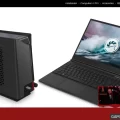Bodhi Linux 7 is looking for testers! Modern 8088 powered retro laptops, measuring progress on the command line, and a slick homebrew Linux handheld.
Listen:
Subscribe Google Podcasts | Spotify | Apple | Stitcher | TuneIn | RSS | More
Timestamps:
00:00 Intro
00:30 Nvidia 4060Ti & AMD 7600
04:37 Bodhi Linux 7.0 Beta
13:22 Measuring CLI progress
18:14 8088 powered laptops
29:39 Pi powered handheld
Bodhi Linux 7.0 Beta
https://www.omgubuntu.co.uk/2023/05/bodhi-linux-7-0-beta/amp
- One of my favorite distros has a new Beta ISO ready for testing, Bodhi Linux 7.0!
- Bodhi Linux 7.0 is based on Ubuntu 22.04 LTS.
- It uses an Enlightenment-based desktop and the Moksha window manager by default, which is a fork of Enlightenment, and is cleaner and better organized.
- There’s a new Plymouth boot screen, and a new login screen theme.
- The distro now uses a new ‘MokshaGreen’ theme and icon set by default, which is a nice dark theme with grays and greens that matches the green leaf wallpaper.
- The Moksha 0.4.0 theming includes lots of improvements, including a new keybindings viewer, refactored modules, new window snapping options, and the Settings Panel/Modules/Gadgets dialog has been resized to 600×500 by default for easier viewing.
- Module tweaks include the battery module relaying charging status better; the clock module adding date/time settings; and the shot module adding “copy to clipboard”.
- The Bodhi Linux 7.0 Beta also ships with a non-Snap build of Chromium as the default web browser, but also includes a web browser manager app to install other browsers.
- There are three kernel releases available to download:
- The base ISO offers Linux kernel 5.15 LTS as shipped in Ubuntu 22.04 LTS last April.
- An ISO with the more recent Linux kernel 5.19 from Ubuntu 22.10.
- And a System76 ISO that pulls in the Linux kernel 6.2 version used in System76’s Pop!_OS.
- I had fun playing with the new Bodhi Linux 7.0 Beta with the Pop!_OS Linux kernel 6.2.
- Bodhi Linux came out in 2011, and it has always been a great distro to run on older hardware, because of its memory efficiency and the lightweight Enlightenment window manager.
- Bodhi has a web based app center, and I always thought that was a great idea, but you also have the awesome and more thorough Synaptic package manager you can use to install apps as well.
CLi %
https://github.com/Xfennec/progress
- How many times have you run cp, mv, dd, tar, gzip on something BIG?
- I ask this because after 30 seconds you tend to sneak a peek at the HDD LED followed by cracking open top to see what’s going on.
- Progress, formerly known as Coreutils Viewer takes some of the mystery out by displaying percentage, estimated time, progress, and throughput.
- I definitely like the new name “progress.” It is a lot easier to remember than Coreutils Viewer, or cv.
- In fact, recently, I was thinking of installing this utility to see the progress of an ISO copy using the dd command to a flash drive but couldn’t remember the name of it! LOL
8088 640KB Lappy
https://www.aliexpress.us/item/3256805342629426.html
- In 1981, when the IBM PC was introduced, Bill Gates said that 640KB of memory “ought to be enough for anybody.”
- Well, that’s also what a Chinese PC manufacturer recently built in a mini laptop which has 640KB of memory, an 8-bit 8088 4.77 MHz processor, along with support for an optional 8087 math coprocessor to speed up computations.
- This new “Book 8088 DOS system” was available from AliExpress for $201 and up, but it sold out quickly. Check back soon for hopefully more inventory.
- It has support for MS-DOS 6.22 and Windows 3.0 or earlier.
- Specs:
- An Intel 8088 chip, IBM-CGA graphics card, 640KB of memory, and a 16-color, 640 x 200 pixel display.
- It does have a 512MB CompactFlash card for storage and a USB port for peripherals, but don’t expect to run new software.
- Optional accessories:
- An OPL3 sound card module with a Yamaha YYMF262-M sound chip.
- An ISA expansion card connector.
- Or an 8087 coprocessor.
- System cost with all addons: $275.
- This looks like a fun little computer for running old DOS games and applications bare metal without the need to run emulation software :-D
- I like the dev board.
- If this thing had a COM port on it I know some people who would buy a stack of them.
Slice of Pi
Handy Pi
https://bytewelder.com/posts/2023/05/20/building-a-handheld-pc.html
https://github.com/ByteWelder/Decktility
- Sometimes the best palmtop is the one you build yourself.
- Introducing Decktility.
- Powered by the still unavailable Raspberry Pi Compute Module 4.
- Well, powered powered by two 18650 cells.
- BTT Pad 5 (800×480) with touch.
- Custom FET board and a fishing line charging light.
- That is one of the nicest looking RasPi cyberdeck palmtops I have seen.











